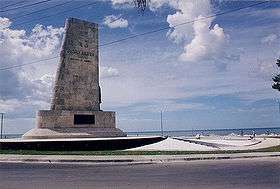Justo Sierra

Justo Sierra Méndez (Campeche, Republic of Yucatán, January 26, 1848 – Madrid, Spain, September 13, 1912), was a prominent Mexican writer, historian, journalist,[1] poet and political figure of the second half of the nineteenth century and early twentieth century.
He was the son of Mexican novelist Justo Sierra O'Reilly, who is credited with inspiring his son with the spirit of literature. Sierra moved to Mexico City at the age of 13 in 1861, the year of his father's death, and also, coincidentally, the year of the French intervention in Mexico. Together with his fellow young students, Sierra responded with patriotic fervor to the invasion of his country, and became a lifelong militant liberal. His most enduring works are sociopolitical histories (at times verging on memoirs) of the era of Benito Juárez and Porfirio Díaz, particularly his political biography of Juárez and his Evolución política del pueblo mexicano. Antonio Caso considered the definitive statement of the age of the Reform in Mexico. Sierra was elected a member of the Mexican Academy of Language in 1887, and served as the Academy's sixth director from 1910 until his death in 1912.
Public service
Elected to several terms as a representative in the federal Chamber of Deputies, Sierra also served the government in various posts. From 1905 to 1911 he agreed to serve as the Secretary of Public Education under the Díaz regime; however, he never made a secret of his liberal sympathies and his distaste for the politics of the authoritarian regime. After the overthrow of Díaz in May 1911 and the election of Francisco I. Madero at the outset of the Mexican Revolution, Madero chose Sierra to serve as the Mexican ambassador to Spain. He died in Madrid in 1912 while serving in his post; his remains were returned to Mexico, where Madero himself presided over his magnificent funeral.
Historian
Justo Sierra made significant contributions to the writing of Mexican history. His texts on pre-revolutionary Mexico continued to be used in Mexican public schools even after the Mexican Revolution. President Álvaro Obregón's Minister of Public Education, José Vasconcelos republished Sierra's Historia Patria for use in schools.[2]
Partial list of works


- Compendio de historia general, México, 1878
- Compendio de la historia de la antigüedad, México, 1880
- Confesiones de un pianista, México, 1882
- Historia general, México, 1891
- Cuentos románticos, México, 1896, 1934, 1946
- Juárez. Su obra y su tiempo, México, 1905–1906
- Historia de México. La Conquista. La Nueva España, Madrid, 1917
- Prosas, México, 1917
- Poemas, México, 1917
- Discursos, México, 1918
- Poesías, 1842-1912, México, 1938
- Evolución política del pueblo mexicano, México, 1941
- Justo Sierra. Prosas, México, 1939
- Obras completas, XV vols., México, 1948-1949.
 Natal house in San Francisco de Campeche.
Natal house in San Francisco de Campeche.
Further Reading
- Garciadiego Dantan, Javier. "De Justo Sierra a Vasconcelos. La Universidad Nacional durante la revolución mexicana." Historia Mexicana, vol. 46. No. 4. Homenaje a don Edmundo O'Gorman (April-June 1997), pp. 769-819.
References
- ↑ Biblioteca Virtual Ignacio Larramendi at www.digibis.com
- ↑ Thomas Benjamin, La Revolución: Mexico's Great Revolution as Memory, Myth, and History. Austin: University of Texas Press 2000, p. 141.
- This article draws on the biography of Sierra by the Academia Mexicana de la Lengua (in Spanish), and on Sierra's works.
- The National Autonomous University of Mexico published his complete works with the direction of Agustín Yáñez in the 1940s.